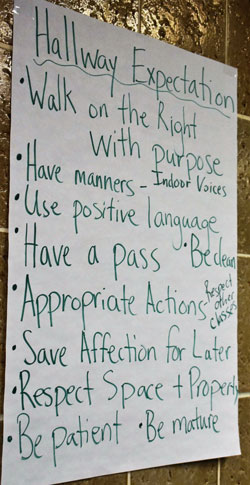Twice a week, science teacher Katie Hoffman spends third period teaching not biology or physics, but civility. Last week, after some icebreakers to get students talking and a brief video on respect, she asked her students how they could make respect a habit.

When you see someone, offer “a smile and a hello,” said one student.
“Instead of saying, ‘Hey you, hey you,’ say their name,” suggested another.
The character-building curriculum, developed in part by Hoffman and a team of Godwin Heights administrators, teachers, counselors and support staff, is taught around the school during what’s known as advisory period.
The curriculum focuses on what students should do instead of what they shouldn’t: as in, yes to holding the door, picking up trash on the floor and welcoming a new student at the lunch table.

It has the obvious benefit of teaching students important life skills and values like self-control, integrity, responsibility and perseverance.
But since its implementation last year, the program’s effects on student behavior in the school have been nothing short of amazing, said Assistant Principal Mike Porco. And the proof is in the data.
Plummeting Problems
The advisory period has been around for some years at the high school, but a grant to participate in Michigan’s Integrated Behavior and Learning Support Initiative made it possible to develop the current decorum-focused curriculum. Once implemented, the payoff was almost immediate.

“After the first week or two, this was just a different place,” said Porco, who quickly noticed less noise in the halls and less traffic in the office. “There’s a feel to data, and then there’s the real data. We tried to match that feeling with numbers, and were staggered on how big of a change that really was.”
The goal was to reduce by 5 percent discipline referrals in each of five categories: disrespect, disruption to the educational process, fighting, insubordination and verbal confrontation.
After one semester, the school saw drops of 45, 54, 52 and 32 percent, respectively, in the first four categories. Verbal confrontation, which had the lowest number of all categories to begin with, increased from the same semester the previous year, from 12 to 30.
By the end of the year, the school had seen double-digit decreases in disciplinary referrals for three of the five categories.
Less Disruption, More Learning

“It has definitely impacted my job,” Hoffman said of the curriculum. “Although we do still have disciplinary incidents, there are many less than in years’ past.”
Focusing on character education, she says, gives her more time to spend on teaching. It also allows teachers to walk alongside students and encourage them to make positive choices that will impact their future — lessons, she says, that will last a lifetime.
Students see the difference too. “Freshman year, everybody was goofing off and yelling at teachers because they thought it was cool,” recalled senior Laciana Gonzalez.
But the introduction of the curriculum and the school’s emphasis on values known throughout the school by the acronym “PRIDE” (Perseverance, Respect, Integrity, Discipline, Engage), have changed the whole culture, she said. Now, incoming freshmen catch on pretty quickly.

“PRIDE teaches kids to be a little bit more mature, and once one person shows it, everybody else kind of follows,” Laciana said. “You see someone holding a door for you, and you hold it for the next person. You don’t think about it; you just do it. It’s something you’re expected to do.”
So what happened over the summer? Have the lessons of last year stuck?
While Porco hadn’t yet crunched the numbers for each focus category, he was encouraged to see that, at a glance, disciplinary referrals were down again from the first few weeks of last year.
“So far, so good,” he said.













